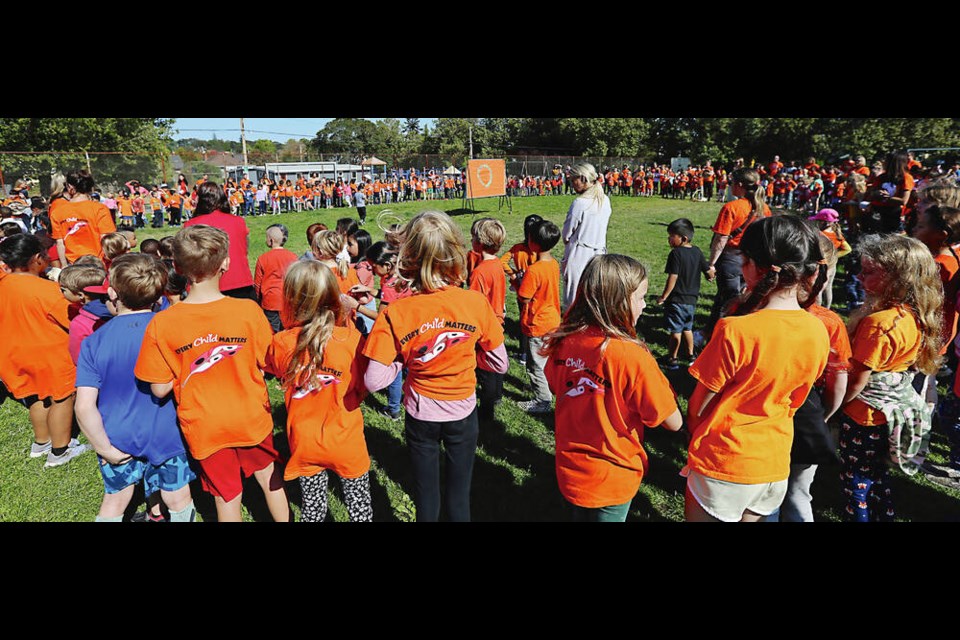Students at George Jay Elementary School wearing orange shirts and holding paper “helping hands” decorated with Coast Salish art gathered for a special outdoor assembly Thursday afternoon.
Like many other schools around the region, George Jay was honouring the National Day for Truth and Reconciliation, today, when schools are closed.
About 440 students, staff members and a number of school families took part, said principal Sarah Winkler, with Grade 4 and 5 students leading the group with drumming.
“We spent the week doing different activities to build children’s understanding of why we’re having the day,” Winkler said.
“I think that’s the beautiful thing about school. We will build over the years with similar messaging, so by Grade 5, students have a much greater understanding of what residential schools were and the impact they had on our Indigenous community.”
Winkler said each student held a helping hand to show that they can help with reconciliation — “Everyone plays a part” — then the students formed a large circle with the hands.
“That shows that we are all one,” she said. “No one is above or below.”
Jon Carr, district principal of Indigenous Education in the Sooke School District, said the National Day for Truth and Reconciliation is important for raising awareness of the intergenerational effects of residential school on individuals, families and communities.
“Really it’s to bring awareness to the concept of ‘Every Child Matters’,” said Carr, whose great, great grandmother survived residential schooling.
He said it’s significant that the Sooke School District and its four Indigenous communities signed an education agreement this week that aims to put truth and reconciliation into action by improving outcomes for Indigenous students. The signing took place in Pacheedaht First Nation territory in Port Renfrew.
Striving to make things better for Indigenous students “is why I come to work every day,” Carr said.
At Camosun College, a Thursday event at Na’tsa’maht: The Gathering Place brought out 32-year-old Brianna Bear, who was holding seven-month-old son Gordie.
The Songhees First Nation woman said she attended on behalf of her grandfather Skip Dick, a residential-school survivor.
Having her son with her was very meaningful, Bear said. “It’s crazy to think that kids that are only a couple of years older than him were taken to residential school,” she said. “I’m so grateful that he’s being raised around culture and able to come to events like this, because a lot of our elders didn’t get to grow up this way.
“It’s sad to think of that.”
Bear said she learned about the horrors of residential schools when she came to Camosun 10 years ago. “I had heard about residential schools growing up, but I’d never heard the negative impacts, just because it’s a sensitive topic for families.”
Bernadine Mawson, 75, of the Tsawout First Nation was also at the event, which she said helped raise awareness of what went on at residential schools. “We’ve been telling our story 40, 50 years now and people haven’t listened, but the ones that are speaking the loudest for us are the children that they’re finding in the graves.”
Residential schools had a big impact on her family of seven siblings, said Mawson, who was at two of them. “Six of us were taken away and were separated into four different schools.”
Talking about what happened can be difficult, Mawson said. “It took some of us a long time to come right out and speak about it.”
Mawson said it is important to understand the lasting effect of residential schools on today’s young Indigenous people. “They’re not understanding why they’re feeling at high risk or suicidal,” she said. “It’s because of the things that we tried to keep from them, but sometimes we do more harm by not talking about it.”
jbell@timescolonist.com



